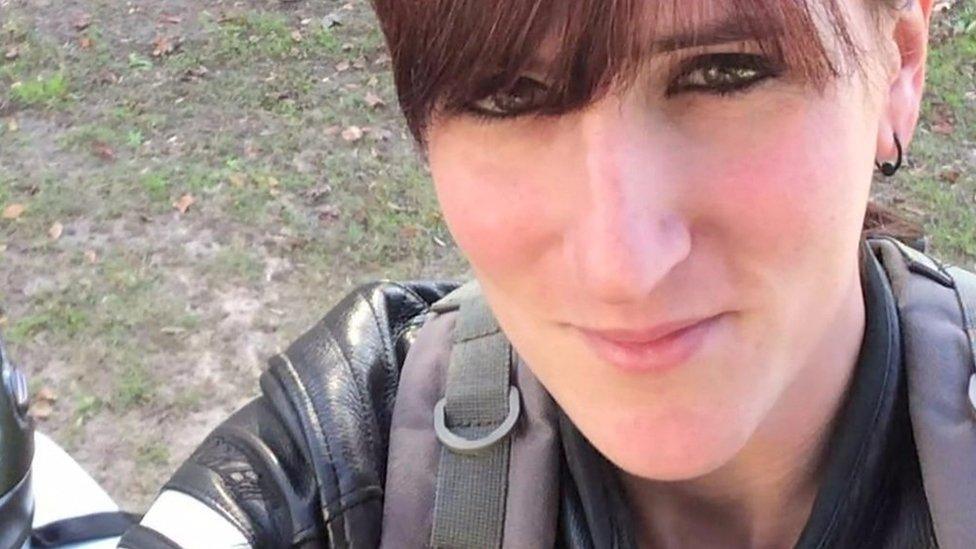Delays leave transgender military recruits in limbo
- Published
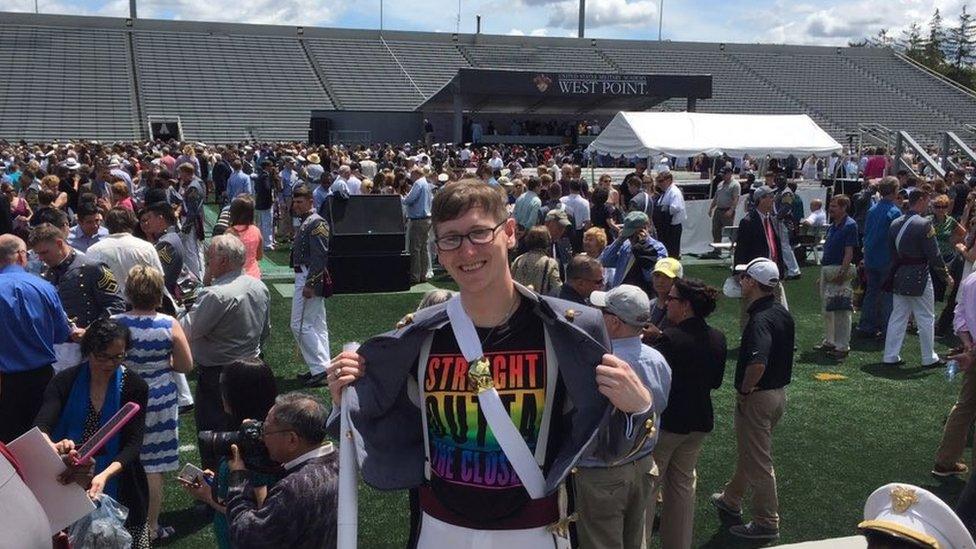
Riley Dosh graduated from West Point in May but won't be able to serve
When then-US Defence Secretary Ash Carter announced last June that transgender people would be permitted to serve openly in the armed forces it was a landmark moment for thousands of troops who had hidden their identities and put off medical treatment, as well as for potential recruits unable to join up.
But a year on from that decision, progress opening the armed forces to transgender Americans has stalled amid delays and attacks from congressional Republicans.
On the eve of the deadline for the Pentagon to begin allowing new transgender recruits, on the first of this month, Defence Secretary James Mattis announced a six-month delay so that the services could "evaluate more carefully" the impact of transgender troops on "readiness and lethality".
Some congressional Republicans celebrated the delay and have since called for the policy to be reversed entirely.
Vicky Hartzler, Republican for Missouri, introduced an amendment at the end of June to the National Defense Authorization Act calling for all transgender service members to be honourably discharged and for funds that would have been used for their medical care to be directed to buying new aircraft.
Several of Ms Hartzler's Republican colleagues spoke in support of her amendment, which she withdrew at the end of the debate but has promised to reintroduce in the House if the Pentagon does not act unilaterally to ban transgender troops.
On Friday, she introduced a new amendment which would bar any military funding from being used to provide medical care related to gender transition, other than for mental health treatment. Her Republican colleague Steve King, Congressman for Iowa, tabled a separate amendment which would ban any funding for gender reassignment surgery or for promotion of what he called the "transgender agenda".
The amendments will go before the rules committee on Wednesday.
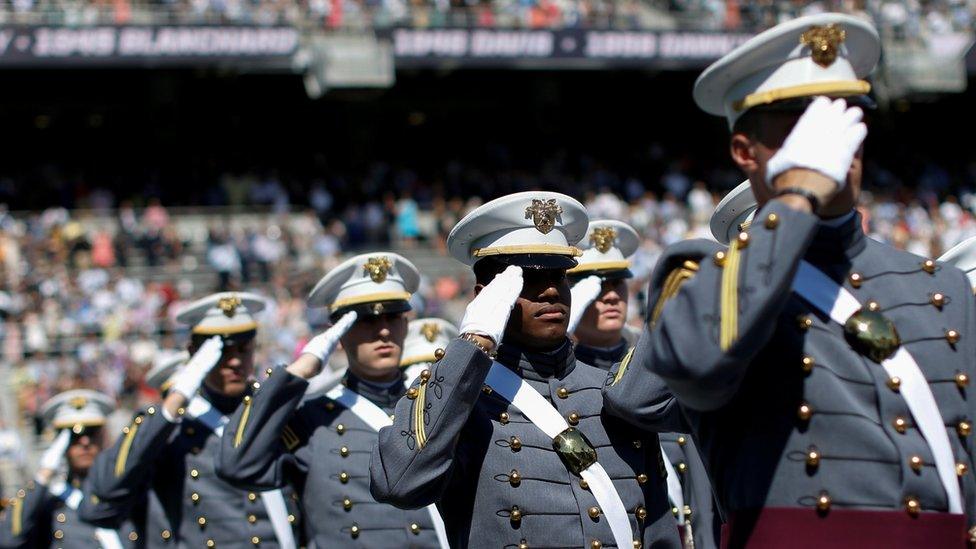
Graduates at West Point military academy in May
Previous NDAA bills have faced similar, unsuccessful amendments, but efforts by Ms Hartzler and others to restrict medical care for transgender service members come amid uncertainty over the future of the open-service policy.
Some conservative advocacy groups praised the decision to delay enlistment by six months. The Family Research Council praised, external the Pentagon for "hitting the brakes" and called the delay "a good first step" in rolling back inclusive service altogether.
'I was completely blindsided'
The new administration's interpretation of the policy change has had an unexpected effect for cadets. When the change was ushered in under the Obama administration, it was assumed that military academy trainees would be regarded as active-duty service members and permitted to come out.
But two cadets who graduated last month - one from West Point and the other from the Air Force Academy in Colorado Springs - were barred from taking up commissions alongside their colleagues and told that they could only join the military in a civil capacity.
Riley Dosh trained for four years at West Point, building towards her graduation in May. She came out in December last year, after the policy change. Then just weeks before her graduation ceremony she was told by the Pentagon she would not be allowed to join the army alongside her colleagues, despite having the full support of her command.
"I was completely blindsided by it," she says. "It was devastating that I'd gone through all of this work and all of these trials and I wasn't going to be allowed to commission. My entire life was planned out for five to 10 years, and suddenly I was going to be unemployed in three weeks."
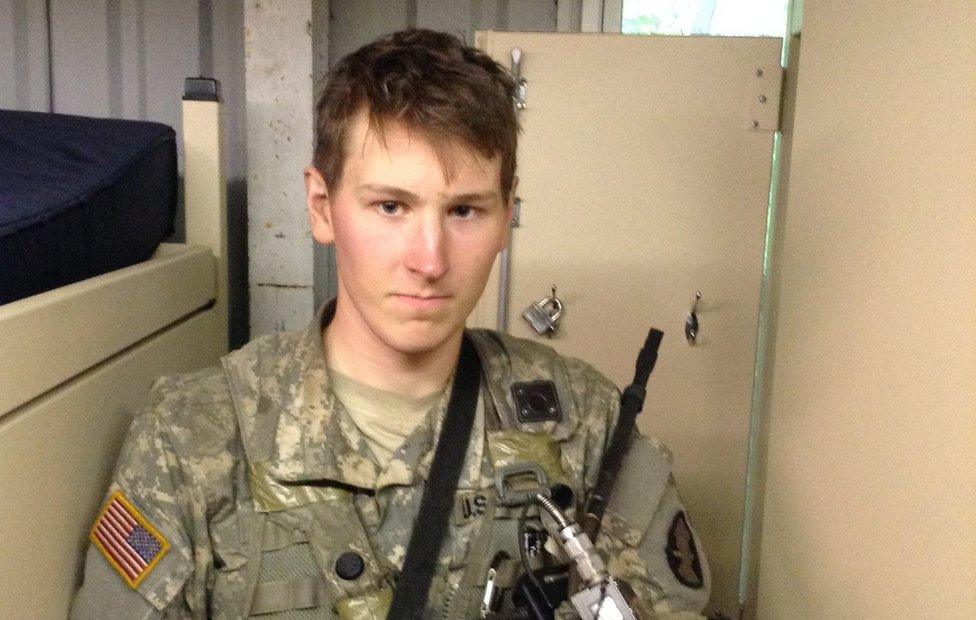
Riley Dosh at West Point military academy
Ms Dosh is now living with her girlfriend in Fort Hood, looking for work, uncertain about her future. She has no healthcare coverage and is not sure whether the six-month delay applies to her. She has begun transitioning, possibly putting her army career further in doubt.
Brad Carson, a former under secretary of defence under President Obama who led the review of transgender military policy, says cadets were supposed to be protected by the policy change. "When you sign up for the military academies you are in the military. You may not have been commissioned but you are in the military," he says.
"The country has invested hundred of thousands of dollars in educating and training these cadets," he adds. "It doesn't make any sense for the nation, for the military, or for those people themselves if they are going to be excluded. It would be a very disappointing result."
A waiting game
One of those waiting is Logan Downs, who first enlisted in 2013 under his birth name, Christine, but was forced to drop out because of a knee injury. After waiting four years, he was planning to visit a recruiting office on July 5th - the first possible day he could re-enlist after the policy change.
"There's nothing I can do now personally apart from keep waiting," he says. "They might say in six months that it's delayed again, or it'll never happen. It's a waiting game."
In the meantime, he's working as an Uber driver in Vancouver, Washington. He says he trusted that the services wanted the delay "for a good reason". "They're trying to figure out lots of tiny little issues," he says. "The ball is rolling so I'm sure it'll happen."
But the delay effectively returns any transgender person wanting to join up to the controversial "don't ask don't tell" policy applied to gay and lesbian service members under the Clinton administration, says Aaron Belkin, director of the Palm Centre, a think-tank which studies the effect of gender and sexuality on the military,
"It forces applicants to lie, and even though there's no ban on being in the military, anyone who now comes out as transgender will be vulnerable to the question - why didn't you tell us at the time of enlistment?", he says. "That will have a chilling effect on the ability of transgender troops to be honest and to get healthcare."
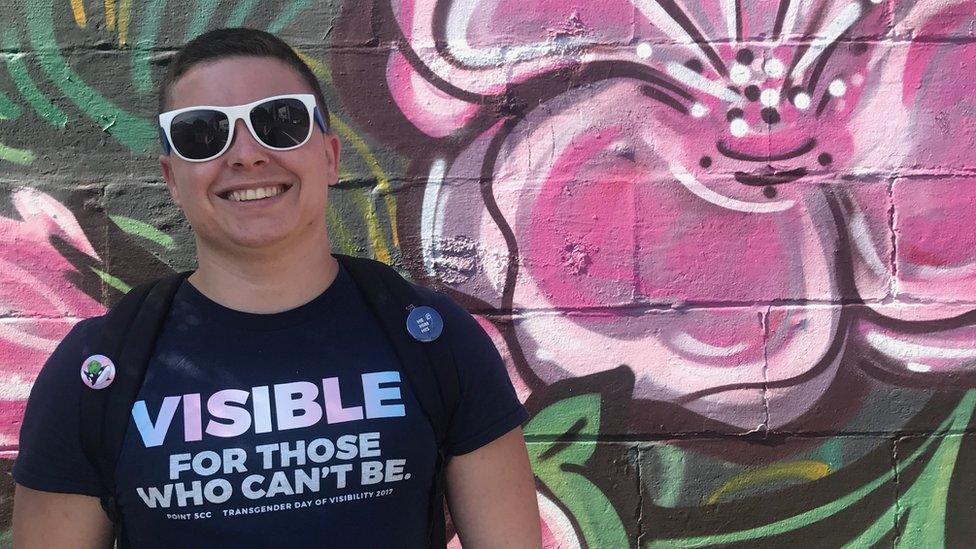
Logan Downs will have to wait at least six months to re-enlist
A 2016 study by the independent Rand Corporation estimated that 2,450 of the 1.2 million active-duty service members are transgender.
Critics of inclusive service have focused on the cost of providing medical care, as well as a possible impact on force readiness and lethality. Ms Hartzler told the House Armed Services Committee that surgery for just 30% of transgender service members alone would cost the Pentagon $1.35 billion over the next 10 years - $135m per year.
That figure is many times over the one provided by the Rand Corporation, which estimated, external that the total cost of transitions, including hormone treatment and surgery, would be somewhere between $2.4 million and $8.4 million annually - a 0.04% to 0.13% increase on the active duty healthcare budget.
Ms Hartzler's office did not respond to a request for comment.
Advocates of inclusive service point to the fact that 18 militaries around the world, including the UK, Canada and Australia, already allow transgender people to enlist and serve openly.
Matt Thorn, executive director of LGBT advocacy group OutServe, says that any further delay in joining that group would be unacceptable.
"We will be watching very very closely what decisions and actions the Pentagon takes over these next six months. We can understand giving them six more months to continue a review, but we are holding them accountable for implementing the policy in January 2018. We won't tolerate an extra delay."
- Published25 June 2016
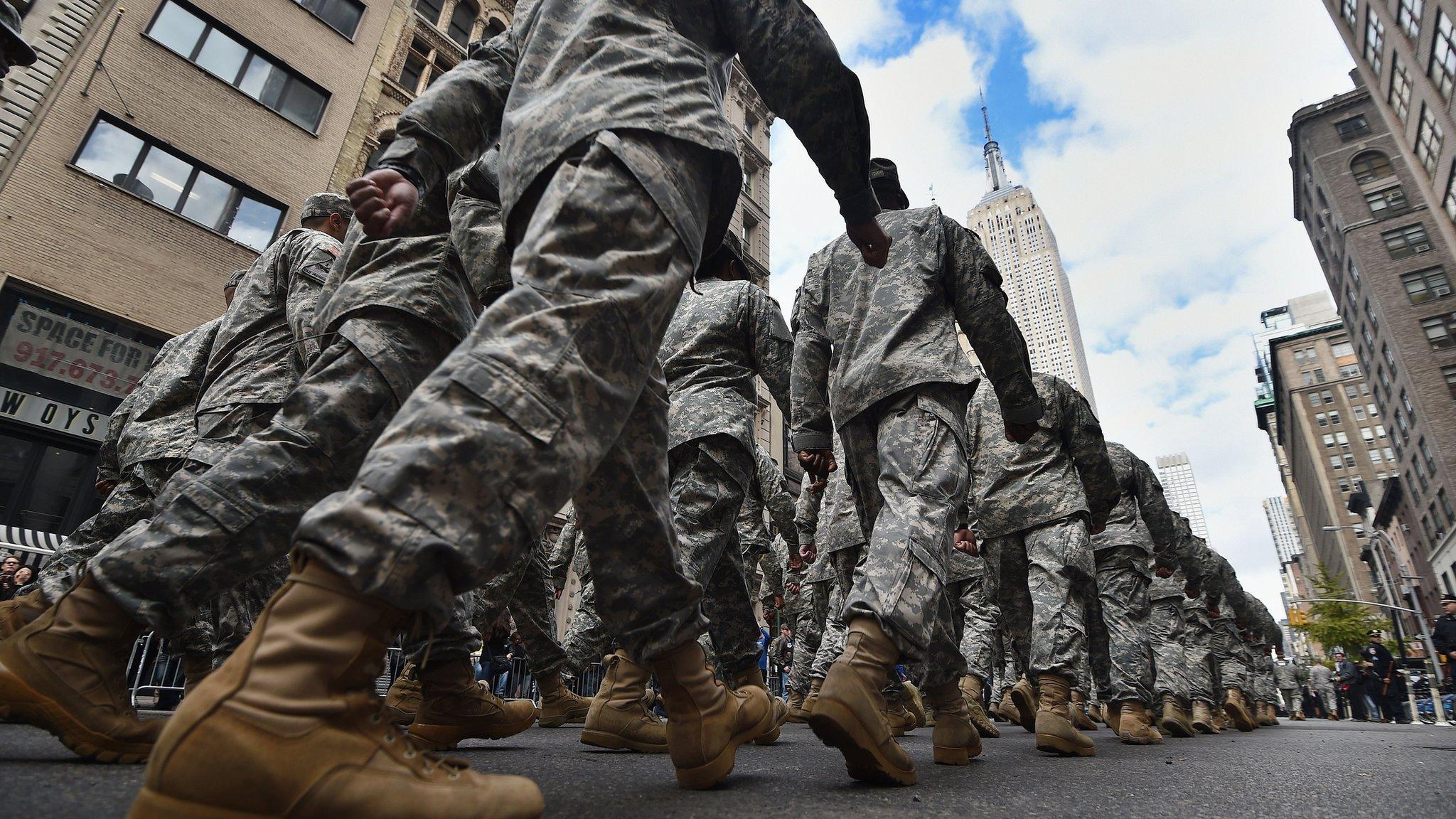
- Published14 June 2016
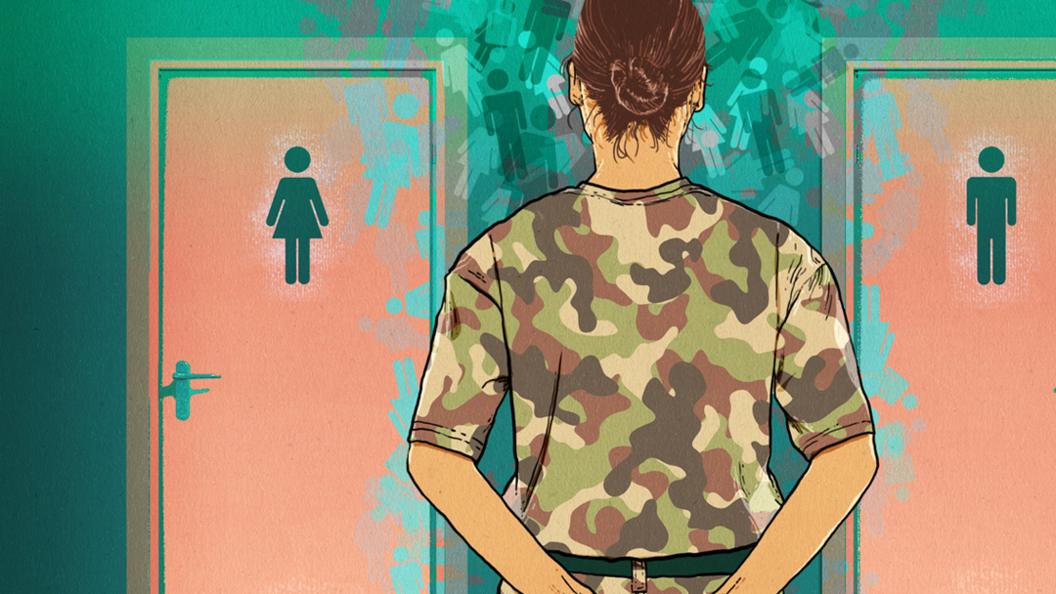
- Published30 June 2016
